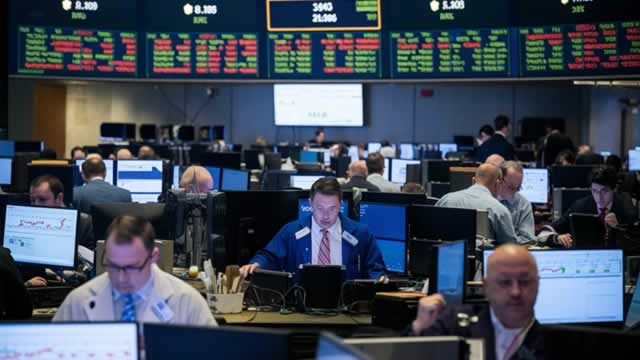Stock Market Forecast: Tech Rebound Amid Tariff Relief, But Volatility and Valuation Risks Persist
The US stock market showed signs of recovery on Tuesday, with futures for the Dow Jones Industrial Average (DJIA) and S&P 500 index rising as tech stocks rebounded on tariff relief news. However, amid this optimistic start to the trading week, market analysts remain cautiously bearish due to persistent volatility and valuation risks.
Tech Stocks Rebound on Tariff Relief
Tech stocks, which have been among the hardest hit sectors in recent weeks, saw a notable rebound on Tuesday. The news of a potential tariff truce between the US and China, which could ease the trade tensions that have been plaguing markets for months, contributed to the rebound. The semiconductor sector, in particular, saw significant gains, with the PHLX Semiconductor index rising by more than 3%.
Volatility and Valuation Risks Persist
Despite the tech sector’s rebound, the broader stock market remains cautiously bearish due to ongoing volatility and valuation risks. The CBOE Volatility Index (VIX), which measures market volatility, has remained elevated, indicating that investors remain nervous about the market’s direction. Furthermore, many stocks continue to trade at high valuations, making them vulnerable to any negative news or economic data.
Impact on Individuals
For individual investors, this cautiously bearish market environment means that it is important to maintain a diversified portfolio and to carefully consider the risks and rewards of any investment. It may also be a good idea to avoid making hasty decisions based on short-term market movements and instead focus on long-term investment strategies.
- Maintain a diversified portfolio
- Consider risks and rewards of investments
- Avoid hasty decisions based on short-term market movements
Impact on the World
On a larger scale, the cautiously bearish stock market forecast could have significant implications for the global economy. Reduced investor confidence could lead to decreased business investment and slower economic growth. Moreover, ongoing trade tensions between the US and China could continue to disrupt global supply chains and negatively impact international trade.
- Reduced investor confidence could lead to decreased business investment
- Slower economic growth
- Ongoing trade tensions could disrupt global supply chains and negatively impact international trade
Conclusion
In conclusion, while the news of a potential tariff truce between the US and China contributed to a rebound in tech stocks on Tuesday, the broader stock market remains cautiously bearish due to persistent volatility and valuation risks. Individual investors should maintain a diversified portfolio and carefully consider the risks and rewards of any investment, while the cautiously bearish market environment could have significant implications for the global economy.
As always, it is important to stay informed about market developments and to consult with financial professionals when making investment decisions. By taking a long-term perspective and focusing on sound investment strategies, investors can navigate even the most challenging market environments.





